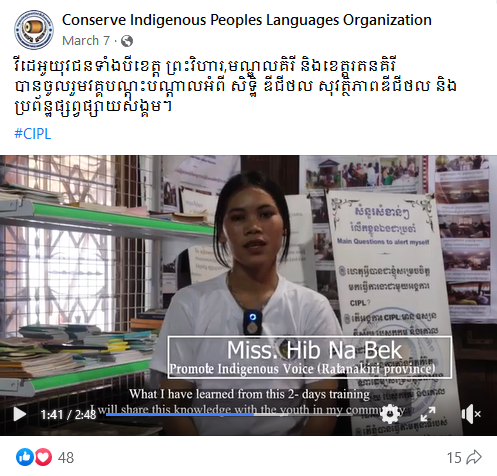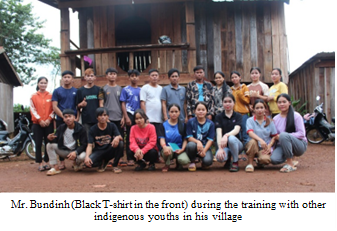The training covered the topics of human rights, digital rights, digital media, and digital trends in Cambodia. Pre and post-test results illustrated that 73% of the trainees improved their knowledge regarding digital security and rights.

Similar Stories
From trainee to trainer: fostering indigenous youths’ capacity to proactively disseminate knowledge in their communities
The Civil Society Activity (CSS) project made significant progress in empowering indigenous voices, through its partnership with Open Development Cambodia (ODC) and Conserve Indigenous People\'s Language (CIPL) Organization. Acknowledging the limitations of training every community member, the project employed a strategic approach: transmitting knowledge from focal persons to their communities. These designated individuals have become conduits for information dissemination, resulting in a profound impact. Mr. Lao Bundinh is a 27-year-old Jarai indigenous youth living with his family in Pak Thum village, Pak Nhai commune, Ou Yadav district, Ratanakiri province. He had limited knowledge regarding social media, script writing, and other technological tools. Nevertheless, he had a strong desire to share his culture and voice with a wider audience through social media channels. He also faced a significant knowledge gap, particularly in the realm of digital security. Throughout his active participation in project activities, training sessions, and engagement with local authorities, he gained valuable insights and became aware of the knowledge gaps he needed to address. Despite encountering various challenges, including barriers related to knowledge, technical skills, and time constraints, he persevered and continued to pursue higher levels of expertise. He seized the opportunity to undertake the role of a trainer, conveying his acquired knowledge to indigenous youths within his community. His training sessions focused on topics such as Facebook security, Telegram two-step verification, and video production scripting. He also has gained the capability to express his insights and address community issues effectively through social media channels while sharing his knowledge within his community. He takes great pride in his personal growth and achievements, having reached this significant milestone. He remains committed to ongoing knowledge sharing and making contributions to increasing awareness among indigenous communities in the future.
Fostering legislative review: Empowering the implementation of Strategic Environmental Assessment (SEA)
In 2023, the Royal Government of Cambodia (RGC) took a significant step towards environmental stewardship by officially endorsing the Environment and Natural Resources Code (ENR Code). This landmark decision incorporated the implementation of the Strategic Environmental Assessment (SEA) as a pivotal element in driving development. Recognizing the significance of this initiative, ODC committed itself to actively supporting the enforcement, dissemination, and monitoring of SEA progress. As part of this commitment, on November 22, ODC, with support from USAID through FHI 360, organized a highly impactful workshop/dialogue to discuss the implementation of SEA. This event brought together key stakeholders, including the Ministry of Environment\'s Department of EIA and the National Council for Sustainable Development (NCSD), as well as representatives from the Ministry of Planning, the Ministry of Tourism, an EIA consultancy firm, and ClientEarth. The participation extended to over 50 Civil Society Organizations (CSOs), Community-Based Organizations (CBOs), journalists, and indigenous representatives from various provinces, all working collaboratively towards sustainable development and inclusivity. The success of the project implementation is evident in the positive shift observed in the behavior of relevant ministries. The increased responsiveness and active participation of these ministries showcase the tangible impact of the project. This success not only marks a significant milestone in advancing SEA implementation but also underscores the project\'s contribution to fostering positive changes within governmental entities, fostering a more collaborative and participatory approach to sustainable national development.
Pride Champions
KUY SovannChai, 17, is a student at General Education and Technical High School in Siem Reap province. Sovannchai became a member of Pride Corner’s core team after he participated in SOGIESC training conducted by Love in Diversity (LID) on August 30-31, 2023. Being a part of the core team, he frequently shares his knowledge to acquaintances about LGBTQI+ and SOGIESC in order for them to gain better understanding. Sovannchai believes that this is valuable information worth learning and spreading. He expressed satisfaction that CSS, through KYA, established a Pride Corner at his school. He believes that the Pride Corner serves as an exceptional place for fostering information dissemination and discussion related to LGBTQI+ issues. In addition, Sovannchai applied the knowledge he gained during the training session to participate in an essay competition focused on respect for LGBTQI+ rights and eliminating discrimination. As a result of his efforts, his essay was one of the top ten essays received. The competition was organized by KYA leading up to the Angkor Youth Camp. In contrast to Sovannchai, HEUN Chanmakara, 22, wasn’t always in agreement with the concept of LGBTQI+. His perception changed following his experience of volunteering with the organizing team for the 9th AYC. Prior to the camp, Makara openly expressed his disapproval of LGBTQI+ individuals during his guest appearance in KYA’s “I Know We Know” podcast. He perceived individuals identified as LGBTQI+ as abnormal and admitted to discriminating against them by avoiding any interaction with them. Taking part in AYC changed Makara’s mindset when it comes to LGBTQI+ and SOGIESC. Makara expressed that he understands these concepts better than ever before. “If a friend confides in me about their identity as an LGBTQI+ individual in future, they can rest assured that they have a supportive ally who will never discriminate against them”, said Makara. Similar to Makara, PREM Neth, 19, wasn’t always very familiar with the topic of LGBTQI+ or SOGIESC. After joining the same training that Sovannchai did with KYA and LID, Neth’s view was expanded. Neth shared that it was her first training about the topic and she, along with other students, gained lots of insights from the training, especially various struggles and challenges faced by LGBTQI+ people. Neth said: “I used to call names to my gay friends making fun of them. I didn’t think that the name calling was hurtful and affected their feelings. It was a mistake that I regret.” “I have since apologized to them and stopped calling them names. I also encouraged other friends to follow my footsteps as well,” Neth added. Neth’s story serves as a great example of how a bit of open-mindedness goes a long way. Not only did she change her own mindset, but she is determined to help changing others,’ including those of her own family. Neth expressed that her participation in KYA’s activities met with a lot of questions at first from her parents, but after taking time to explain to them, her parents approved of her involvement with KYA’s activities. PREM Neth is one of KYA’s core members who often participated in KYA’s activities, including sharing sessions


